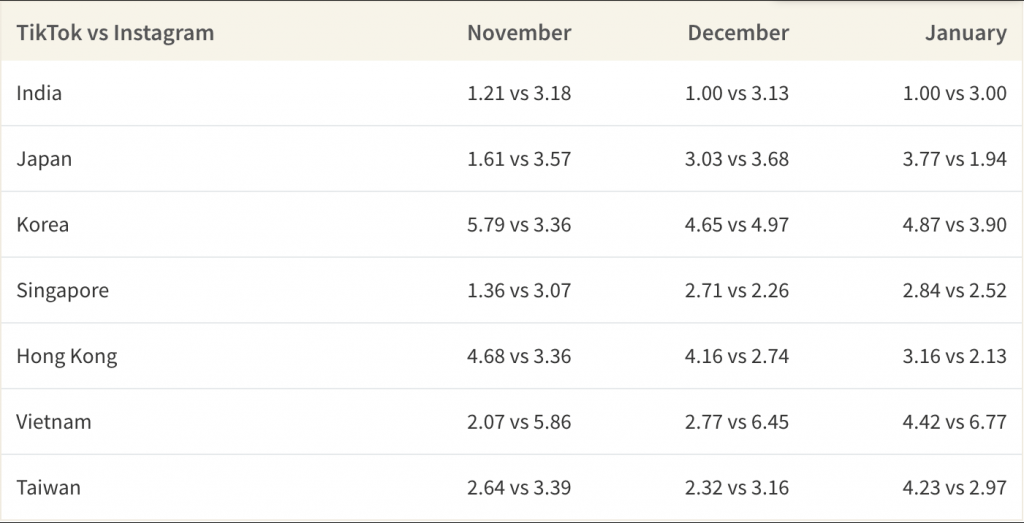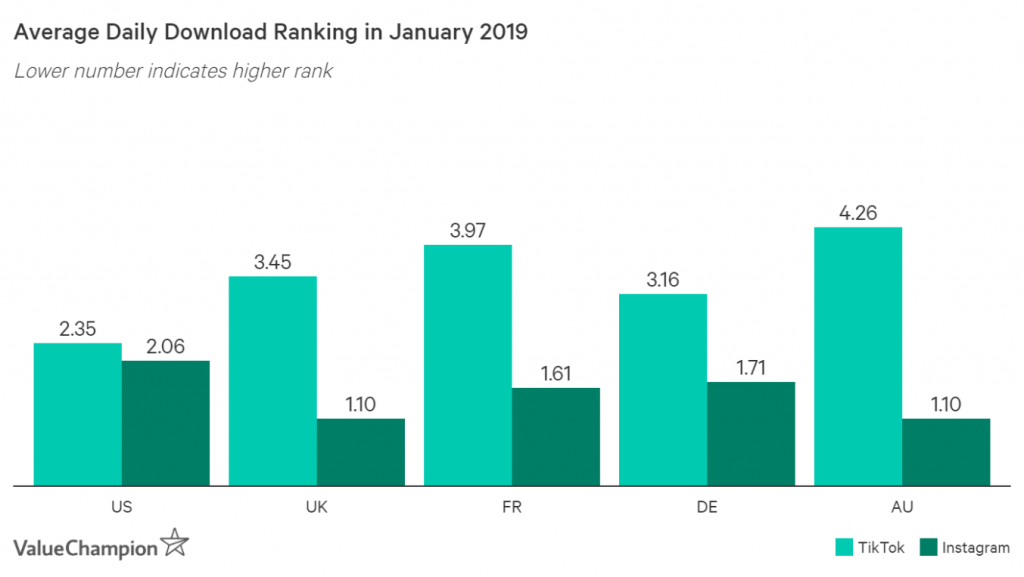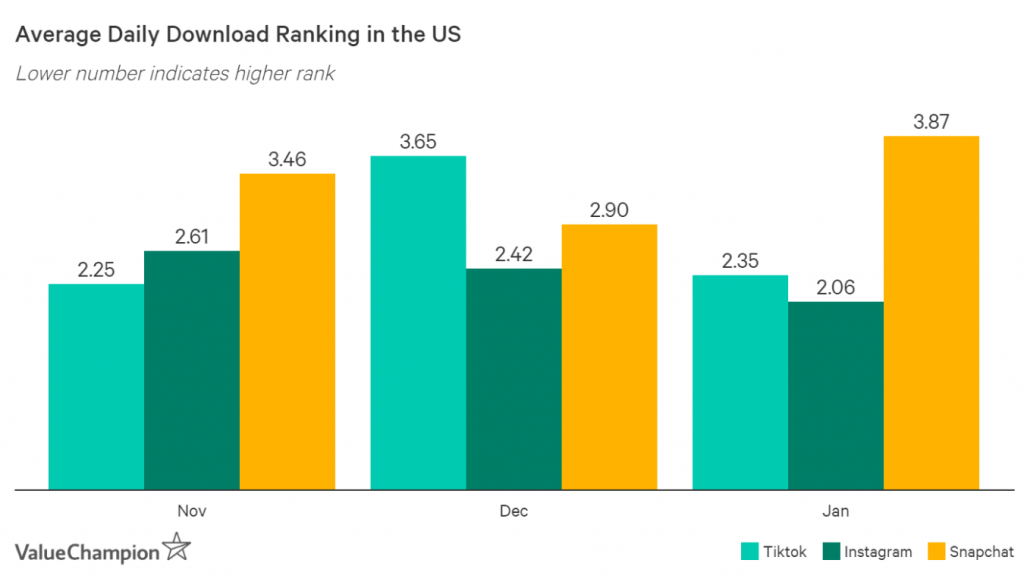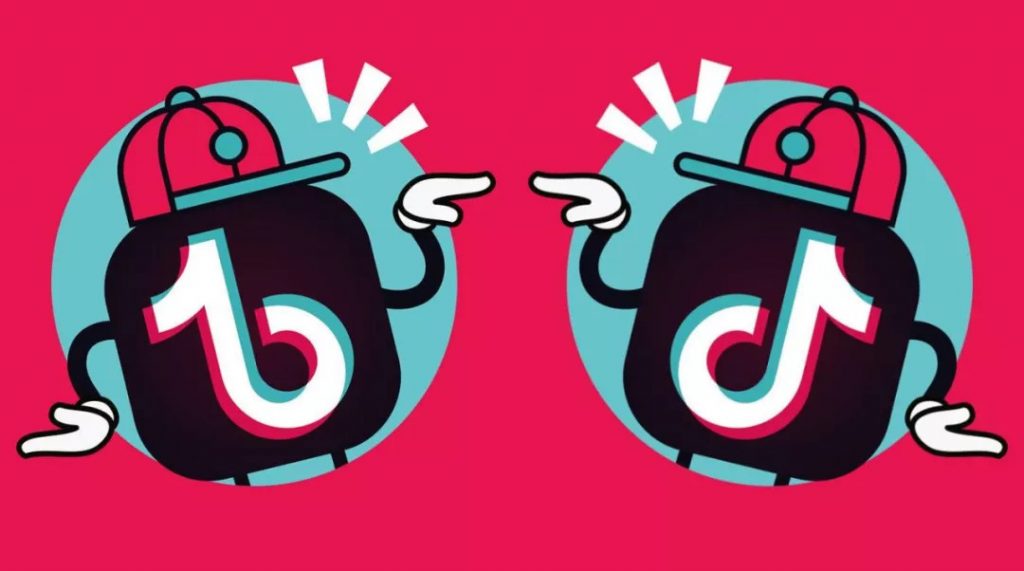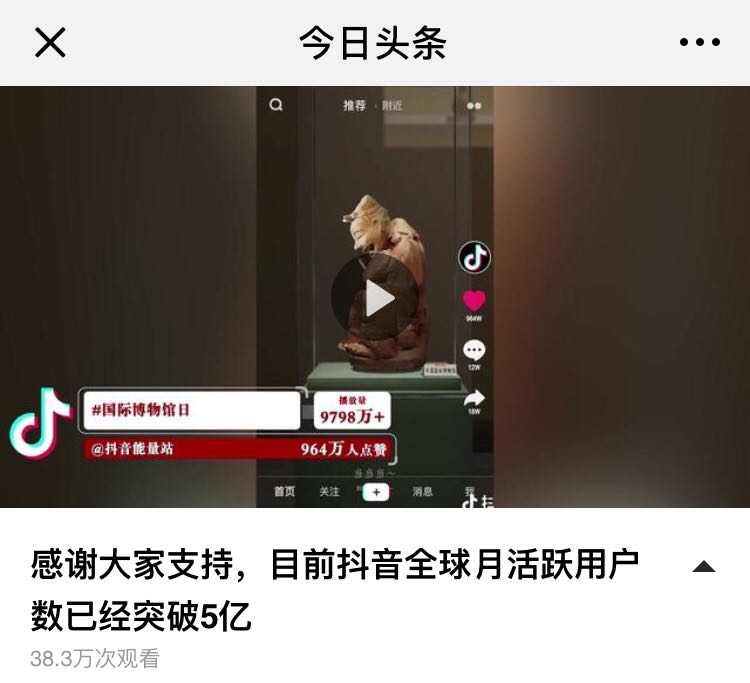
Douyin announced it has 500 million global monthly active users. (Source: Screenshots of Douyin’s page on Jinri Toutiao.)
The rise of Tiktok, Bytedance’s short video-sharing app, is no secret. It has made Bytedance the highest-valued startup in the world. What is less appreciated is the challenge is poses to the established social networks Facebook, Instagram, and Snapchat. With daily downloads on par with Instagram across many Asian markets and the United States, it has displaced Snapchat as Facebook’s biggest challenger.
In parts of Asia, TikTok, known as Douyin in China, is already beginning to overtake Instagram in terms of downloads. For example, TikTok ranked as the most downloaded Photos & Videos app on the Apple App Store in India from November to January, while Instagram lagged behind at 3rd place behind Youtube. In other Asian countries like Korea, Japan, Taiwan, Singapore and Hong Kong, Instagram and TikTok were neck and neck in terms of their download rankings, further demonstrating that Instagram’s dominance over this category of apps no longer remains unchallenged in the region.
Even in Instagram’s US home market, the two apps were tied at about second place in January app store download rankings. With TikTok’s global reach and easily relatable content, its success could spread to Europe as well.
TikTok’s user base outside of China is most likely still much smaller than that of Instagram: it reported a monthly active user base of about 200 million outside of China in July 2018, compared to Instagram’s 1 billion. But given the trend we’ve seen in download rankings, TikTok is likely growing faster than Instagram, and may already be almost as big as, if not bigger than, Snapchat.
Facebook: Buy or clone?
The widespread and rapid growth of TikTok should at least raise a few eyebrows in Facebook’s board room. As a social network, Facebook competes for consumers’ time, and any other app that sucks a large number of users and their time away from Facebook’s apps threatens the company’s growth prospects. This is why Facebook acquired challengers Instagram and Whatsapp, and also attempted to buy Snapchat numerous times before eventually cloning it with the “Stories” functionality.
But since Bytedance is a Chinese company with global ambitions, it’s uncertain whether an acquisition is even a possibility, even if Facebook were willing and able to accept Bytedance’s $70 billion valuation. On the other hand, Facebook has a good chance to overcome this threat by copying TikTok’s features onto its own apps.
TikTok’s main features include a “newsfeed” of short videos, various social features like follow, like, share, and message, and an easy-to-use tool for creating videos with background music. Facebook and Instagram already have most of these besides the last one, which shouldn’t be difficult to add on to its existing functionalities.
While it is not certain if Facebook clones can halt TikTok’s growth, Snapchat’s failure to overcome the Menlo Park Goliath should make Bytedance wary.
Snapchat left in the dust
While Facebook may be relatively well protected from TikTok, Snapchat’s situation is starkly different. Snapchat is already struggling to remain relevant and grow its user base. That another competitor is doing so much more successfully, especially with young demographics, is terrible news for the company. In the US, TikTok already outranks Snapchat in Photo & Video app download rankings, and it is catching up in Europe. As for Asia, the region has long been a lost cause for Snapchat.
What happened to Vine?
The success of TikTok raises another interesting question: just what happened to Vine? The TikTok consumer experience is only modestly different from Vine. It’s a giant “newsfeed” of short, user-generated videos, usually accompanied by some music in the background. Most videos are geared towards generating likes and followers through comic or visual appeal, a dynamic we’ve seen in most other social networks: Vine, Facebook, Instagram, and even Snapchat. So what makes TikTok worth $70bn (granted, Bytedance also owns many other apps with huge user numbers), while Vine was acquired for $30 million only to be shuttered a few years later?
As far as we can tell, the real difference between Vine and TikTok are product features, and thus the execution of their management teams. TikTok has innovated on top of Vine’s experience by incorporating music and creating great tools that users can easily leverage to create great content. Given the similarity of the two platforms’ core concepts, their vastly different experience is a cautionary tale about the importance of a management team’s execution ability. Had Twitter innovated with Vine as well as Bytedance has with TikTok, it might be a much bigger player than it is today.
– This article appeared on TechNode. A version of this post was previously published by ValueChampion, a research firm that aims to help consumers make smarter decisions with their money.


